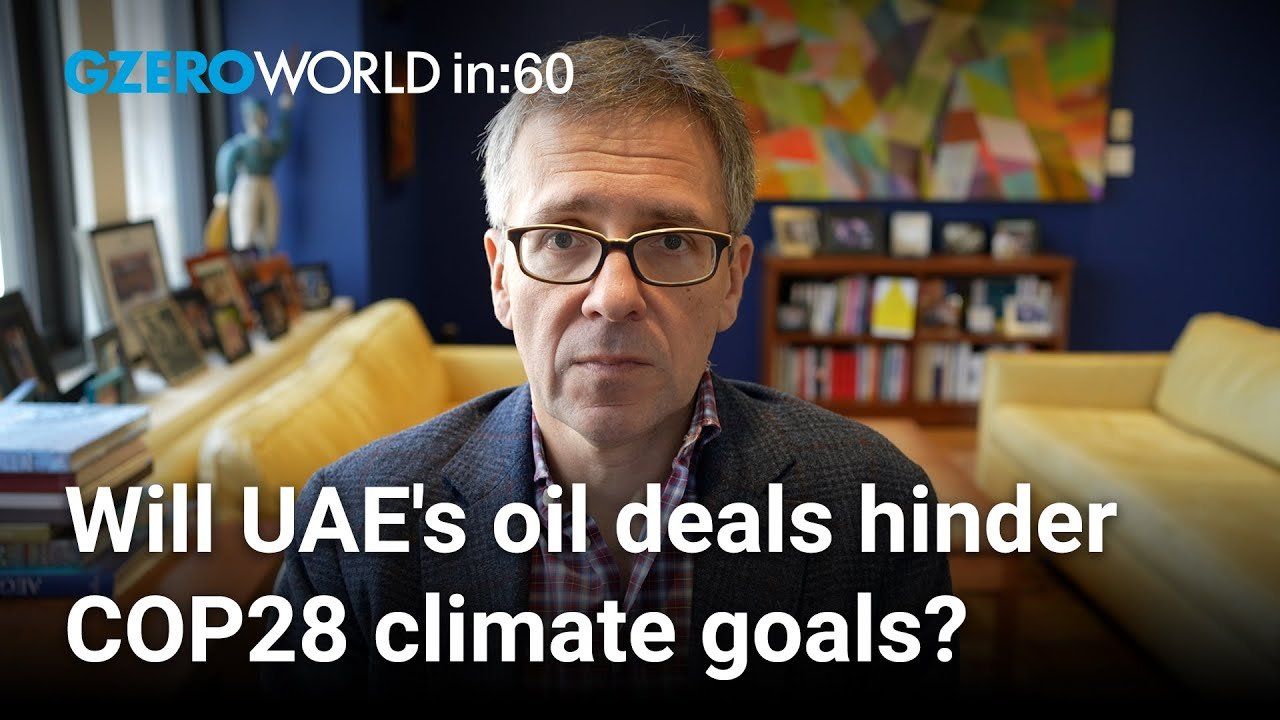Ian Bremmer shares his insights on global politics this week on World In :60.
Will the UAE’s pursuit of oil deals during COP28 undermine the summit's climate goals?
Well, it certainly doesn't make it any easier. I mean, this is the time when the world comes together and tries to reduce the level of carbon in the atmosphere, and the fact that it's being hosted by one of the world's largest oil producers and by the chairman, the CEO of one of the world's largest oil companies, who also is driving his country's sustainability goals. Well, I mean, I guess you can say he's hedged. You can definitely say that but you can also say it's challenging and problematic. Look, there was a chance that COP was going to fall apart completely and you were just going to have fragmented bilateral deals. The Chinese, for example, get much more influence giving out money directly in return for things with countries than being a part of a multilateral group. Having said that, US and China recently have come together on climate in advance, specifically of COP28, and there is more movement on methane emissions from the two largest emitters in the world. There's more movement on carbon capture and storage than we've seen before. Look, I'm glad the meetings happened. It is happening. It's going to be more successful than it not showing up. But there are big challenges and you're going to hear those frustrations loudly from the developing world who are taking climate on the chin.
How will Taiwan's upcoming election affect US-China relationship?
It's coming up January 13th and it look like there was a deal being put together between the two opposition candidates. That deal is now falling apart, which means it is more likely that the vice president and his representative in Washington who is going to run on the ticket with him for the DPP, the Nationalist Party, the pro autonomy as the Chinese government in Beijing says the pro-independence party, is likely to win. That means more tensions over Taiwan, with China and Taiwan and with the Americans and China. So definitely next year that's going to be a more significant risk, something for us all to watch.
Will Elon Musk provide Starlink to Gaza?
Sure he will, as long as the Israeli government says it's okay. The interesting point here is that do you want decisions over where technology is and is not provided that will change the security balance on the ground between countries decided by one man. That is what happened with Russia and Ukraine, largely to Ukraine's favor, though not consistently and not always. That is what's happening in Israel and Gaza to Israel's favor. And that is what would happen between mainland China and Taiwan in mainland China’s favor, because that's where Elon has all of his economic bets, not in favor of Taiwan. And by the way, if you're the US government or a NATO member or Japan, what that means is that you really need to be developing your own technologies or having those technologies in companies that are national champions like Lockheed was in the days in the 20th century, first company ever referred to as “too big to fail” because of the dangers to American national security if something happened to it. This is a very important issue what I call a techno-polar moment and one that is becoming much more significant over time.
More For You
Think you know what's going on around the world? Here's your chance to prove it.
Most Popular
Canadian Prime Minister Mark Carney has repeatedly tussled with US President Donald Trump, whereas Mexican President Claudia Sheinbaum has tried to placate him. The discrepancy raises questions about the best way to approach the US leader.
10,000: The number of Hamas officers that the militant group reportedly wants to incorporate into the US-backed Palestinian administration for Gaza, in the form of a police force.
